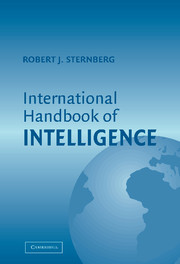Book contents
- Frontmatter
- Contents
- List of Contributors
- Preface
- 1 Intelligence Research and Assessment in the United Kingdom
- 2 Intelligence – Theory, Research, and Testing in the Nordic Countries
- 3 The Psychology of Human Intelligence in Spain
- 4 Psychology of Human Intelligence in France and French-Speaking Switzerland
- 5 Research on Intelligence in German-Speaking Countries
- 6 Is It Possible to Study Intelligence Without Using the Concept of Intelligence? An Example from Soviet/Russian Psychology
- 7 Intelligence Theory, Assessment, and Research: The Israeli Experience
- 8 Intelligence and Intelligence Testing in Turkey
- 9 Intelligence: What Is Indigenous to India and What Is Shared?
- 10 Japanese Conception of and Research on Human Intelligence
- 11 Diligence Makes People Smart: Chinese Perspectives of Intelligence
- 12 Similar Thoughts under Different Stars: Conceptions of Intelligence in Australia
- 13 Being Intelligent with Zimbabweans: A Historical and Contemporary View
- 14 Intelligence Research in Latin America
- 15 North American Approaches to Intelligence
- 16 Human Intelligence: From Local Models to Universal Theory
- Index
- References
15 - North American Approaches to Intelligence
Published online by Cambridge University Press: 05 June 2012
- Frontmatter
- Contents
- List of Contributors
- Preface
- 1 Intelligence Research and Assessment in the United Kingdom
- 2 Intelligence – Theory, Research, and Testing in the Nordic Countries
- 3 The Psychology of Human Intelligence in Spain
- 4 Psychology of Human Intelligence in France and French-Speaking Switzerland
- 5 Research on Intelligence in German-Speaking Countries
- 6 Is It Possible to Study Intelligence Without Using the Concept of Intelligence? An Example from Soviet/Russian Psychology
- 7 Intelligence Theory, Assessment, and Research: The Israeli Experience
- 8 Intelligence and Intelligence Testing in Turkey
- 9 Intelligence: What Is Indigenous to India and What Is Shared?
- 10 Japanese Conception of and Research on Human Intelligence
- 11 Diligence Makes People Smart: Chinese Perspectives of Intelligence
- 12 Similar Thoughts under Different Stars: Conceptions of Intelligence in Australia
- 13 Being Intelligent with Zimbabweans: A Historical and Contemporary View
- 14 Intelligence Research in Latin America
- 15 North American Approaches to Intelligence
- 16 Human Intelligence: From Local Models to Universal Theory
- Index
- References
Summary
WHY THEORIES OF INTELLIGENCE MATTER TO SOCIETY
Underlying every measurement of intelligence is a theory. The theory may be transparently obvious, or it may be hidden. It may be a formal explicit theory or an informal implicit one. But there is always a theory of some kind lurking beneath the test. And in the United States, at least, tests seem to be everywhere.
The Pervasiveness of Intelligence-Related Measurements
Students who apply to competitive independent schools in many locations, notably New York City, must present an impressive array of credentials. Among these credentials, for many of these schools, is a set of scores on either the Wechsler Preschool and Primary Scale of Intelligence – Revised (WPPSI-R) or the Stanford-Binet Intelligence Scale, 4th Ed. (Thorndike, Hagen, & Sattler, 1986). If the children are a bit older, they may take instead the Wechsler Intelligence Scale for Children, 3rd Ed. (WISC-III; Wechsler, 1991). The lower-level version of the Wechsler test is used only for very young children ages 3 to 7 ½ years. The higher-level version of the Wechsler test is used for somewhat older children, ages 6 to 16 years, 11 months, of age. The Stanford-Binet test is used across a wider range of ages, from 2 years through adult.
Children applying to independent schools in other locations are likely to take either these or similar tests. The names may be different, and the constructs they are identified as measuring may be different – “intelligence,” “intellectual abilities,” “mental abilities,” “scholastic aptitude,” and so forth.
- Type
- Chapter
- Information
- International Handbook of Intelligence , pp. 411 - 444Publisher: Cambridge University PressPrint publication year: 2004
References
- 6
- Cited by

